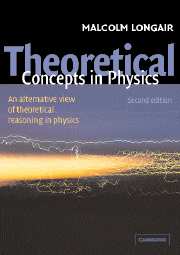Book contents
- Frontmatter
- Contents
- Preface and acknowledgements
- 1 Introduction
- Case Study I The origins of Newton's laws of motion and of gravity
- Case Study II Maxwell's equations
- Case Study III Mechanics and dynamics – linear and non-linear
- Case Study IV Thermodynamics and statistical physics
- Case Study V The origins of the concept of quanta
- Case Study VI Special relativity
- Case Study VII General relativity and cosmology
- Index
Preface and acknowledgements
Published online by Cambridge University Press: 05 June 2012
- Frontmatter
- Contents
- Preface and acknowledgements
- 1 Introduction
- Case Study I The origins of Newton's laws of motion and of gravity
- Case Study II Maxwell's equations
- Case Study III Mechanics and dynamics – linear and non-linear
- Case Study IV Thermodynamics and statistical physics
- Case Study V The origins of the concept of quanta
- Case Study VI Special relativity
- Case Study VII General relativity and cosmology
- Index
Summary
The inspiration for this book was a course of lectures which I delivered between 1977 and 1980 to undergraduates about to enter their final year in Physics and Theoretical Physics at Cambridge. The aim of the course was to provide a survey of the nature of theoretical reasoning in physics, which would put them in a receptive frame of mind for the very intensive courses of lectures on all aspects of physics in the final year. The objectives of the course are described in the first chapter and concern issues about which I feel very strongly: students can go through an undergraduate course in physics without gaining an understanding of the insights, approaches and techniques which are the tools of the professional physicist, let alone an impression of the intellectual excitement and beauty of the subject. The course was intended as an alternative to the normal mode of presentation and was entitled Theoretical Concepts in Physics.
An important feature of the course was that it was entirely optional and strictly non-examinable. The lectures were delivered at 9 am every Monday, Wednesday and Friday during a four-week period in July and August, the old Cambridge Summer Term, prior to the final year of the physics course. Despite the timing of the lectures, the fact that the course was not examinable, and the alternative attractions of Cambridge during the summer months, the course was very well attended.
- Type
- Chapter
- Information
- Theoretical Concepts in PhysicsAn Alternative View of Theoretical Reasoning in Physics, pp. xv - xviiiPublisher: Cambridge University PressPrint publication year: 2003



